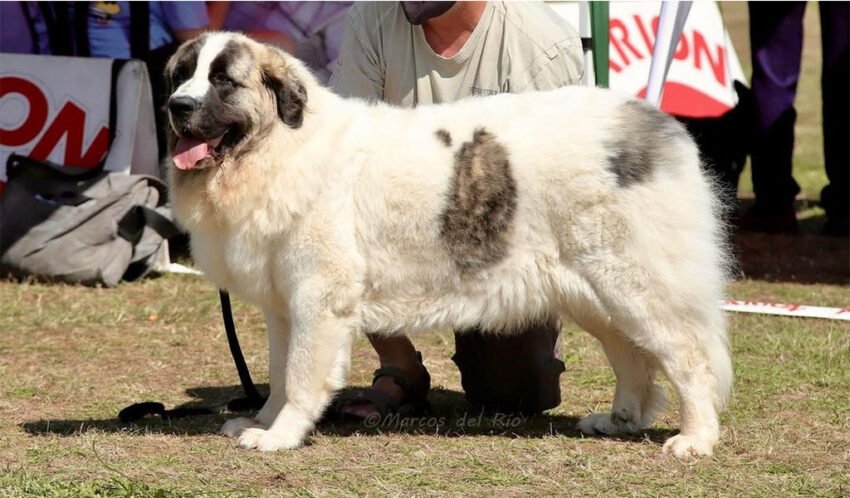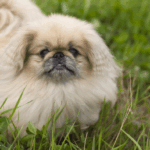Introduction to the Pyrenean Mastiff
The Pyrenean Mastiff is a large, powerful dog breed known for its impressive size and gentle temperament. Originating from the Pyrenees region between France and Spain, these dogs are primarily known for their roles as livestock guardians. They have a rich history intertwined with pastoralism, providing protection to sheep and other animals against predators.
Historically, the Pyrenean Mastiff has been revered not just for its strength, but for its loyalty and gentle nature. This breed is characterized by its majestic appearance, further enhanced by its long, thick coat which serves to insulate and protect against harsh weather conditions. With the right care and training, the Pyrenean Mastiff can be a wonderful family pet as well as a dedicated working dog.
Physical Characteristics
The physical traits of the Pyrenean Mastiff are striking. Males typically weigh between 110 to 150 pounds, while females are slightly smaller, ranging from 80 to 120 pounds. Their height ranges from 28 to 32 inches, making them one of the larger breeds in the canine world.
One of the most notable features of the Pyrenean Mastiff is its thick, double coat, which can come in various shades including white, fawn, and brindle. Their broad head and strong neck add to their imposing appearance, but it is their gentle eyes that often capture the hearts of those who meet them.
Coat and Grooming
The double coat of the Pyrenean Mastiff requires regular grooming to keep it healthy and to prevent matting. During shedding seasons, which typically occur twice a year, the need for grooming increases significantly. Brushing at least once a week is recommended, with more frequent grooming during these shedding periods.
In addition to regular brushing, it’s important to bathe the Pyrenean Mastiff as needed. A good quality pet shampoo should be used to maintain the integrity of their coat. Special attention should also be paid to ear cleaning, nail trimming, and dental hygiene to ensure overall health and wellness.
Common Health Issues
While the Pyrenean Mastiff is generally a hardy breed, they can be prone to certain health issues. Some common health concerns include hip dysplasia, elbow dysplasia, and certain cardiac issues. Regular veterinary check-ups are essential for early detection and management of any potential health problems.
Maintaining a healthy diet rich in essential nutrients can also help minimize the risk of developing some health conditions. Consultation with a veterinarian can provide insights into the best dietary options for this impressive breed.
Temperament and Behavior
Despite their imposing size, Pyrenean Mastiffs are known for their gentle and affectionate nature. They are loyal to their families and can often be protective, making them excellent guardians. Their calm demeanor often contrasts with their size, creating a unique paradox.
Early socialization is crucial for this breed. Exposing them to various environments, people, and other animals while they are young helps mitigate any potential behavioral issues. Training should be consistent and firm, yet gentle, to ensure they respond well to commands without developing stubbornness.
Socialization
Socialization should start as early as possible, ideally when the puppy is between 3 and 14 weeks old. This period is critical for developing social skills and behavioral patterns. Exposing them to new experiences, different environments, and various people can help shape their personalities positively. Attending puppy classes and ensuring regular interaction with other dogs and people is beneficial.
It is important to monitor their interactions with smaller pets and children. While generally gentle, the size of the Pyrenean Mastiff requires supervision around smaller animals and young kids to ensure safe play and avoid any unintentional injuries.
Training Approach
Training a Pyrenean Mastiff requires patience and consistency. Positive reinforcement methods are highly effective, as this breed responds well to praise and rewards. They tend to have an independent streak, which can mean that traditional training methods that rely heavily on authority may not be as effective.
Set clear boundaries and expectations from the beginning. Keep training sessions short and engaging, incorporating a mix of obedience commands and fun activities. This not only keeps the dog interested but also strengthens the bond between pet and owner.
Feeding and Nutrition
Feeding a Pyrenean Mastiff properly is vital to maintaining their overall health and well-being. Due to their size, it is recommended to feed them high-quality, large-breed dog food that addresses their unique dietary needs. This type of food typically includes balanced quantities of proteins, fats, and carbohydrates, along with essential vitamins and minerals.
Proper portion control is necessary to avoid obesity, which is a risk for large breeds. Feeding schedules should maintain routine and consistency, and it’s important to divide daily meals into two or three smaller portions to reduce the risk of bloat, a serious condition that can affect large dogs.
Recommended Dietary Guidelines
| Age Group | Daily Caloric Intake | Type of Food |
|---|---|---|
| Puppies (up to 6 months) | 1500 – 2500 calories | High-quality puppy food |
| Adults (1-6 years) | 2000 – 4000 calories | Large breed formula |
| Senior (7 years and older) | 1500 – 2500 calories | Senior dog formula |
Important Nutritional Considerations
When selecting food for your Pyrenean Mastiff, look for high-quality ingredients that are specifically formulated for large breeds. Ingredients should list real meat as the first component, with adequate amounts of carbohydrates and fats for energy. Ensure that the food is free from fillers, by-products, and artificial additives.
Always provide access to fresh water, and be mindful of their activity level before adjusting food portions. Feeding may also need to be adjusted based on environmental factors, such as climate and living conditions. Consult with a veterinarian for tailored nutritional advice based on individual needs and lifestyle.
Caring for Your Pyrenean Mastiff
Caring for a Pyrenean Mastiff transcends basic feeding and grooming. These dogs require regular exercise, mental stimulation, and socialization to thrive. Daily walks and playtime in a secure, fenced yard are ideal to keep them physically fit and mentally active.
However, due to their size and strength, it is crucial to ensure that they have adequate control on a leash and that their exercise is well-regulated to prevent strain on their joints. Avoid excessive high-impact activities until they are fully grown, to reduce the risk of developmental issues.
Physical Activity Requirements
A well-exercised Pyrenean Mastiff will be a happy and well-adjusted dog. While they enjoy outdoor activities, they also appreciate quiet time at home with their families. The balancing act is to ensure they get enough physical and mental exercise without overexertion. Shorter yet more frequent exercise sessions are preferable to long, exhausting ones.
Engaging these dogs in activities like swimming or gentle games can stimulate them while being easy on their joints. Additionally, training sessions that incorporate mental challenges will keep their minds sharp and active, contributing to their overall well-being.
Creating a Safe Environment
Ensuring a safe environment for a Pyrenean Mastiff is critical, especially since they can be large and powerful. A secure fence in the yard is essential to prevent them from roaming unsupervised, which may lead to dangerous situations. Inside the home, providing a space for them to retreat to when they need quiet is beneficial.
Be mindful of household items that may pose risks, especially smaller objects that could be ingested. Pyrenean Mastiffs, driven by curiosity, may explore by putting things in their mouths. Regularly reviewing the environment can help minimize any potential hazards.
FAQs
What is the lifespan of a Pyrenean Mastiff?
The average lifespan of a Pyrenean Mastiff is around 10 to 13 years. Factors that can influence longevity include genetics, overall health, diet, and lifestyle. Regular veterinary visits and a healthy lifestyle can help maximize their life expectancy.
Are Pyrenean Mastiffs good with children?
Yes, Pyrenean Mastiffs are generally very good with children. Their gentle and calm demeanor makes them suitable family dogs. However, supervision is key, especially with younger children, because their large size can lead to unintentional rough housing. Early socialization with children is also important in ensuring they are comfortable and well-behaved around them.
How much exercise do Pyrenean Mastiffs need?
Pyrenean Mastiffs require moderate exercise to stay healthy. A daily routine of walks, playtime, and mental stimulation is essential. While they enjoy physical activities, they should not be over-exercised, especially in their younger years, due to stress on their developing joints.
Conclusion
The Pyrenean Mastiff is a remarkable breed that combines loyalty, gentleness, and strength. Their history as livestock guardians contributes to their protective nature and calm demeanor. With relentless devotion and the right care, these dogs can thrive in family settings, offering security and companionship.
Proper training, socialization, nutrition, and a safe environment are key elements in raising a happy and healthy Pyrenean Mastiff. When provided with ample love and attention, they can become cherished family members who are both playful and protective. Whether used for work or companionship, the Pyrenean Mastiff embodies traits that endear them to dog lovers around the world.







